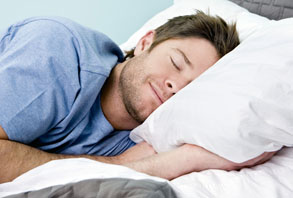We live in a get-it-done-today, multi-tasking society, where statistics show that only about 60% of Americans get the prescribed “8 hours of sleep” each night.
Yet researchers believe people should sleep more because their very lives may depend on it. In two recent, large studies, participants who got 7 to 8 hours sleep per night lived significantly longer than those who got less.
Sleep – It’s Good For You!
Here’s why researchers believe sleep impacts health so significantly: during the day the body’s metabolism is in a state of actively coping with the many demands made upon it that often results in physical, mental, and emotional strain. This state is called catabolism. The body is breaking down stored energy and reserves to meet demands.
At night when the body is resting, another form of metabolism, called anabolism, takes place. This involves repairing damaged tissues, strengthening the body, and building up health and energy reserves. Some of this restoring occurs during the day as well, but some repair and tissue building only occurs during sleep.

Without adequate sleep, the body becomes exhausted, fatigue sets in, and health and quality of life are seriously impaired.
Insomnia for Some
The National Sleep Foundation recommends at least 7 to 8 hours of sleep each night for adults (more for children and teens). Since millions of Americans report insomnia as one of the leading causes of interrupted or reduced sleep times, the Foundation encourages insomniacs to improve their sleep by following the tips below:
- Be physically active daily. Exercise helps reduce stress and feelings of anxiety and helps you relax. People who exercise regularly fall to sleep faster and get more sleep than those who don’t exercise. Get your exercise earlier than just before bedtime. Exercising just before bedtime makes you feel wider awake, not sleepy.
- Be regular in your sleep habits. The more closely you follow a consistent schedule, the better your sleep habits will be.
- Inspect your sleeping area. Where you sleep should be quiet, dark, comfortable, and cool for best sleep patterns.
- Develop a routine that works for you. Do something just before you go to sleep each night that helps you relax and prepare for sleep. It may be a warm bath, reading a book, or listening to relaxing music. Enjoy the relaxing time and then fall off to sleep.
- Avoid drinking coffee or other caffeinated beverages several hours (6 to 8 hours) before bedtime. Smoking is also a stimulant, and should be avoided before bedtime.
- Avoid late meals. Most people don’t sleep well with a full stomach.
- Avoid drinking alcohol. Although it may make you feel drowsy at first, it can lead to interrupted sleep later.
- Don’t watch exciting movies just before you try to go to sleep.
- Don’t stay in bed too long if awake. If you can’t fall asleep within 15 to 20 minutes after turning out the lights, it’s best to get up out of bed and do another relaxing activity such as reading until you feel sleepy.
- Consider a midday nap. If you find a short nap midday refreshes you and makes you more alert, add it to your daily routine. It’s generally best not to take long naps or nap close to bedtime, as it will disturb your sleep at night.
- Avoid late hours. Some sleep experts feel that the sleep you get before midnight may be your best sleep. Keeping late hours is generally not a good health habit.
If your attempts to increase your sleep have failed, or if you continue to have difficulty with insomnia, contact your doctor. He or she may be able to suggest some over-the-counter, herbal or prescribed remedies to ease your sleeping challenges.
